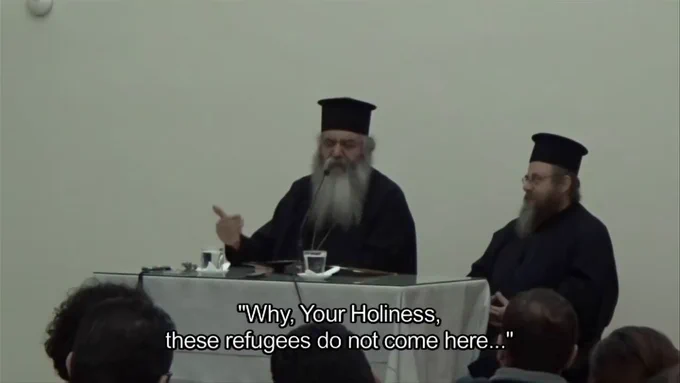Eastern Orthodox Christian☦️ Trying to stay on the Royal Path⚖️ America will be holy🇺🇸
Joined June 2024
- Tweets 4,154
- Following 3,922
- Followers 1,064
- Likes 42,207
. retweeted
The Moscow Patriarchate’s rejection of an errant ecumenism:
‘The essential goal of relations between the Orthodox Church and other Christian confessions is the restoration of that unity among Christians which is required of us by God (Jn. 17:21). Unity is part of God's design and belongs to the very essence of Christianity. It is a task of the highest priority for the Orthodox Church at every level of her life. Indifference to this task or its rejection is a sin against God's commandment of unity. According to St. Basil the Great, “all who are really and truly serving the Lord should have this one aim—to bring back into union the Churches that have been severed from one another” (Letter 114).
Nevertheless, while recognising the need to restore our broken Christian unity, the Orthodox Church asserts that genuine unity is possible only in the bosom of the One, Holy, Catholic and Apostolic Church. All other “models” of unity seem to us to be unacceptable.
The Orthodox Church cannot accept the assumption that despite the historical divisions, the fundamental and profound unity of Christians has not been broken and that the Church should be understood as coextensive with the entire “Christian world,” that Christian unity exists across denominational barriers and that the disunity of the churches belongs exclusively to the imperfect level of human relations.
According to this conception, the Church remains one, but this oneness is not, as it were, sufficiently manifest in visible form. In this model of unity, the task of Christians is understood not as the restoration of a lost unity but as the manifestation of an existing unity.
This model repeats the teaching on “the invisible Church” which appeared during the Reformation. The so-called “branch theory”, which is connected with the conception referred to above and asserts the normal and even providential nature of Christianity existing in the form of particular “branches,” is also totally unacceptable.’
–Basic Principles of the Attitude of the Russian Orthodox Church Toward the Other Christian Confessions (ratified in August 2000 at the Jubilee Bishops’ Council)
. retweeted
New video that explores the textual and patristic basis for two natures in Christ both in Philippians 2:5-7 and in other verses of the Bible. No long-winded nonsense, pure biblical theology in the link below:
. retweeted
.@LepantoInst REVEALS Catholic Campaign for Human Development funded radical socialist group pushing abortion and ‘trans healthcare.’
lifesitenews.com/analysis/us…
. retweeted
On Wednesday, after a year-long battle with cancer, the Lord has taken my father from this life, to the next at the age of 54❤️
I’m in awe of the love, humility and peace he displayed during his awful pain.
All Orthodox faithful please pray for the soul of my father Joseph🙏🏾☦️
. retweeted
Made a free app for Orthodox churches to have their own "app". Next closest service looks to cost churches about $100 a month. We need to level up the tech in the Orthodox space. Many tradesmen offer their support to build our parishes, we gotta step up on the tech side and do the same.
. retweeted
Antiochian hierarch calls for prayers for persecuted Ukrainian Metropolitan Arseny of Svyatogorsk
orthochristian.com/173815.ht…
Met. Arseny was recently sentenced to another 60 days of pre-trial detention after being released for less than a day following a year and a half in custo...
. retweeted
Ukrainian FPV drone operators mercilessly murder an innocent civilian woman on her knees, praying for her life with the sign of the Cross as she flees the Ukrainian lines toward the Russian positions. Lord have mercy.
. retweeted
🚨🇺🇸🇮🇱 BREAKING: CANDACE OWENS confirms that 12 Israeli-registered cell phones were detected at Utah Valley University on the day Charlie Kirk was ASSASSINATED
. retweeted
As a Protestant I used to discuss theology with a Greek friend of mine I knew from Brazillian Jiu Jitsu. At the gym we would often debate between rolls- and discuss apologetics.
A year or so ago I went with him to his first tournament to show him support. Before the tournament he pulls out a small icon of Jesus, kisses it then looks to me and says- “If I take gold, Icon veneration is correct”
He took gold that day.
GG brother
. retweeted
⚡️🇮🇱🇺🇸 BREAKING
The Swastika sign found in New York after Mamdani’s election was painted by an Orthodox Jew.
. retweeted
🚨 BREAKING:
🇫🇷 Marine Le Pen set to REPLACE Macron Soon:
“Every day, hundreds of foreigners come here to France, intending to live as they did back home.
Mass Immigration is not an opportunity, it’s a tragedy for France.”
. retweeted
BREAKING: Governor of Nebraska defunds every single Planned Parenthood abortion facility in the state.
Praise God!
. retweeted
Шта је потребно на почетку? Читај Јеванђеље, моли се и веруј у простоти свога срца да те Господ воли - био ти велики подвижник или најпростији човек; Он је за тебе пролио Своју Крв и ти си Његово духовно чадо.
. retweeted
Paulinus of Nola: “[Constantine] removed Andrew from the Greeks and Timothy from Asia; and so Constantinople now stands with twin towers, vying to match the hegemony of great Rome...for he counterbalanced Peter and Paul with a protection *as great*..." (Thuno, Reliquaries, 152)










































